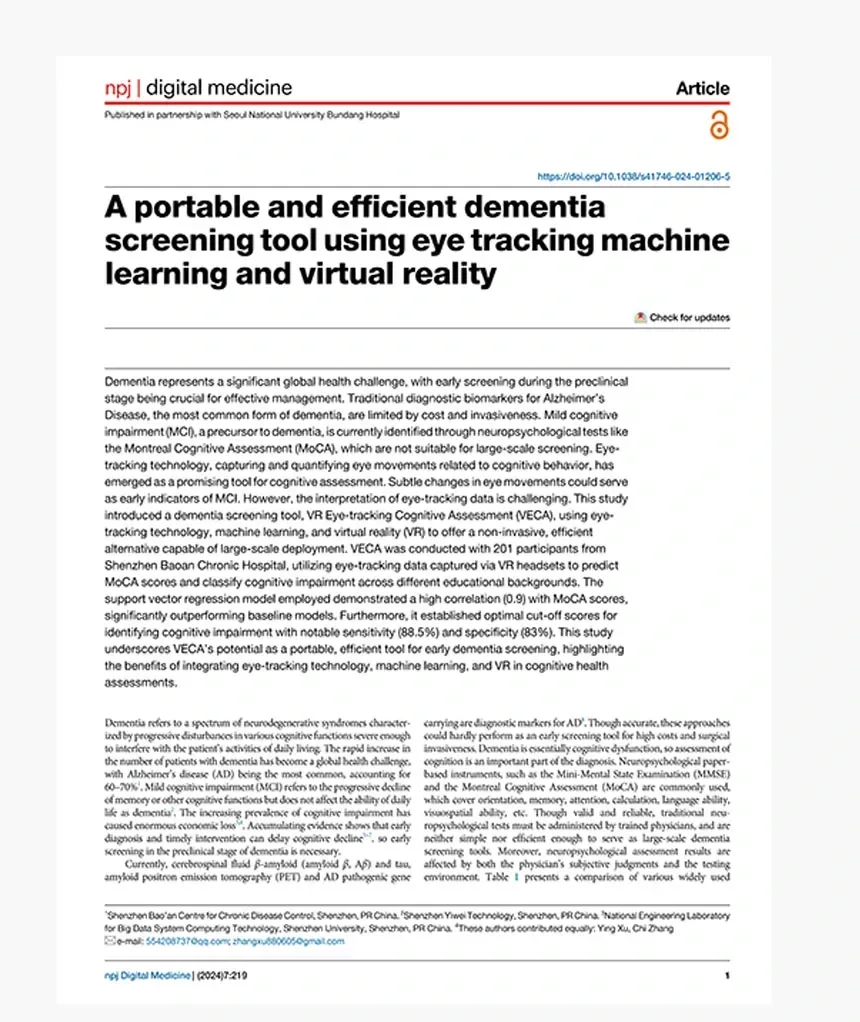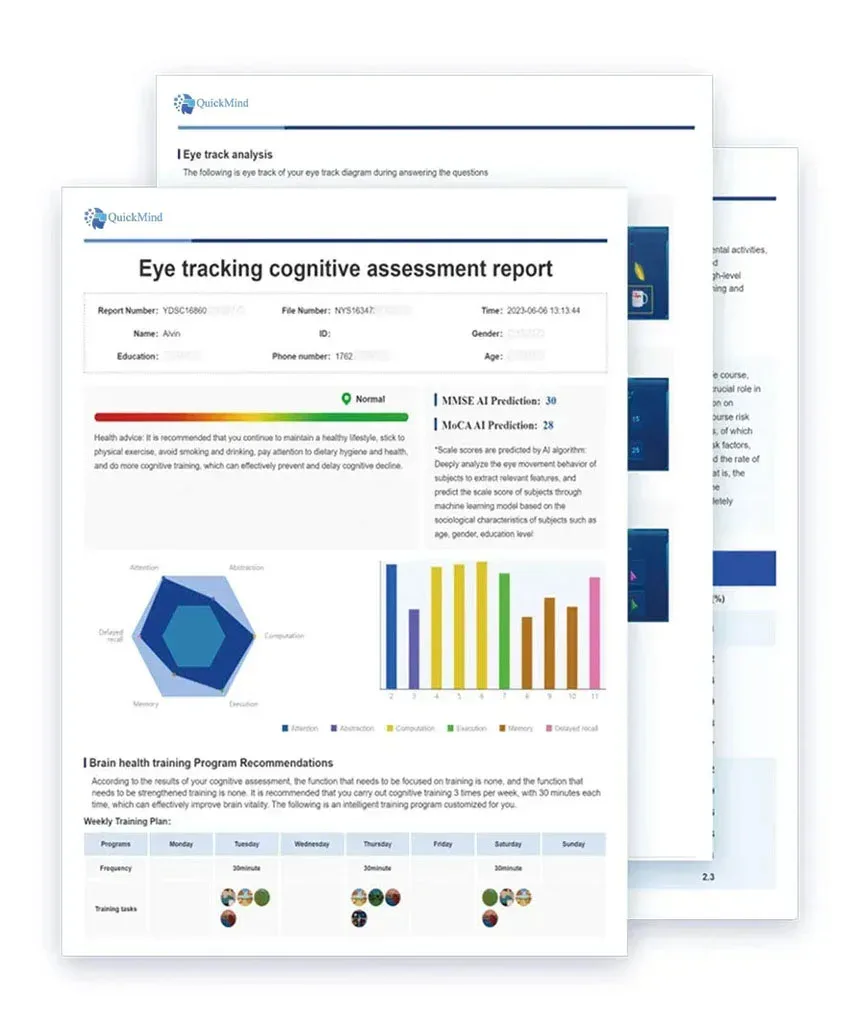
Increasing assessments proposes that augmented reality platforms program can dramatically enhance the experiences of individuals dealing with brain function deterioration. By moving them to relaxing surroundings, VR presents a distinctive chance for cognitive stimulation, emotional regulation, and collective involvement. Countless research works have confirmed that VR therapy can minimize anxiety states, nervousness, and low mood in dementia patients individuals while also augmenting their cognition, awareness, and expressive competencies.
- VR empowers individuals with dementia to retrace esteemed pasts through responsive illustrations.
- Besides, it can grant a risk-free and facilitative space for collective interaction, promoting a notion of connection and belonging.
- Experts consider that VR therapy has the chance to transform dementia management by giving new and state-of-the-art avenues to confront the difficult barriers faced by persons managing this condition.
Tech-Driven Cognitive Therapies for Alzheimer's Patients
Innovative electronic remedies are revealing effectiveness in the area of brain function boosting for subjects suffering from Alzheimer's ailment. These technologies leverage computing power to energize brain processing and possibly reduce the spread of the illness. Engaging activities, personalized recommendations, and intellectual training are some illustrations of techniques being studied in this evolving area. While examinations are happening, digital therapeutics enable a supportive avenue for strengthening the health of those living with Alzheimer's disease.Novel VR Techniques for Alzheimer's Intervention
Involving clients dealing with Alzheimer disorder, the gradual loss of cognition and mental competence can markedly compromise their competence to connect with the external setting. This devastating disease often leads in isolation, confusion, and a lessened self-awareness. Fresh breakthroughs in virtual reality technology introduce a innovative opportunity to combat these complications by constructing immersive settings that can ignite the brain and rekindle cognitive function.
Digital reality environments tailored specifically for Alzheimer's clients can engulf them in safe surroundings, such as their juvenile habitat or a preferred green space, triggering positive memories and alleviating anxiety. Through interactive practices, these virtual worlds can also engage cognitive abilities like remembrance, alertness, and judgment.
The likely improvements of virtual reality in Alzheimer's therapy are manifold. Early examinations have shown encouraging results, with clients indicating improvements in cognitive ability, mood, and overall quality of life. As this mechanism evolves, it holds the key to reshaping the way we approach Alzheimer's disease, affording a new pathway for help and enabling.
Computer-Aided Reminiscence for Alzheimer's Victims
Reminiscence therapy is a traditional technique used to advance cognitive function and mental state in individuals with Alzheimer's disease. This conventional form of therapy involves stimulating patients to share past experiences, often through interchange. However, a novel approach is emerging: VR-mediated reminiscence therapy.
This immersive solution utilizes virtual reality headsets to transfer patients in convincing environments that evoke memories from their past. By experiencing these constructed realities, individuals with Alzheimer's can interact with their past in a expressive way.
Harnessing VR to Improve Cognitive Abilities in Dementia
Virtual reality (VR) is emerging as a novel resource in the fight against dementia, delivering state-of-the-art ways to improve memory and cognition. By building immersive environments, VR can support individuals with dementia revisit memories, connect in meaningful activities, and develop cognitive faculties. Studies have revealed that VR interventions can result in substantial improvements in memory recall, attention, and cognitive awareness. Moreover, VR provides a secure and beneficial space for individuals with dementia to display, reducing feelings of isolation and concern.
- In addition, VR can be tailored to individual needs and preferences, helping enhanced levels of engagement.
- In spite of the promise of VR, further research is needed to fully understand its long-term results in dementia care.
Recovering Recall and Connections: Virtual Reality's Social Benefits in Alzheimer's
Computer-generated digital experiences is emerging as a state-of-the-art tool in the sector of cognitive disorders. By creating compelling and interactive environments, VR has the power to revive memories, foster social interaction, and advance the overall quality of life for subjects coping with Alzheimer's. One of the most impressive aspects of VR is its ability to carry users to vintage settings and moments from their past. Whether it's a visit to a childhood home or a representation of a beloved holiday, these virtual explorations can summon happy memories and strengthen cognitive performance. digital therapy Furthermore, VR can encourage social interaction by uniting individuals with others who share similar hobbies. This can be particularly helpful for people with Alzheimer's who may find it difficult with traditional social interaction. By offering a safe and interactive virtual space, VR can reduce feelings of isolation and loneliness, which are common among individuals coping with Alzheimer's. Overall, VR holds immense prospect for innovating the lives of subjects with Alzheimer's by refreshing memories, recovering connections, and advancing their quality of life. As technology continues to grow, we can expect even more innovative applications of VR in the field of dementia care.Employing Cognitive Training: Employing VR Tools for Alzheimer's Care
Simulated immersive settings is rapidly emerging as a cutting-edge tool in the realm of cognitive training, particularly for persons managing Alzheimer's disease. By immersing patients in interactive and engaging virtual environments, VR-based interventions can activate cognitive functions such as memory, attention, and problem-solving. These games typically incorporate elements of storytelling, exploration, and social interaction, making the training process very motivating. Studies have shown that VR-based cognitive training can lead to substantial improvements in cognitive performance, theoretically delaying the progression of Alzheimer's symptoms. Moreover, VR provides a safe and controlled environment for patients to practice new skills and grow their confidence.
- Game-style methods in VR training can make it exceptionally compelling and amusing for participants with neurological deficits.
- VR simulations can offer realistic scenarios that test and activate cognitive functions.
- Personalized VR experiences can cater to distinct expectations and habits.
Virtual Reality as a Renewed Opportunity for Dementia Patients
Immersive virtual reality offer a modern and positive avenue for clients facing memory loss. These technologies can emulate familiar environments, allowing those affected by cognitive decline to engage with cherished memories and develop a sense of ease. By addressing the burdens of dementia, VR spaces have the ability to upgrade quality of life for both subjects and their advocates.
- Investigations indicate that VR approaches can noticeably impact cognitive function, behavioral well-being, and even physical abilities in individuals with dementia.
- Moreover, VR enables a safe and supervised environment for experience, reducing the risk of anxiety.
- Also, VR can facilitate social relationships by allowing individuals with dementia to communicate in augmented activities with others.
Employing VR to Detect and Treat Alzheimer's Early
cognitive Alzheimer's illness manifests a sophisticated challenge, often going undetected in its early stages. Despite this, virtual reality (VR) is appearing as a cutting-edge tool for early detection. Through immersive environments, VR can monitor cognitive capacity in ways that traditional methods are inadequate to. This capacity allows for quick response strategies, potentially pausing disease progression and enhancing the quality of life for users with Alzheimer's.
- VR cognitive tests measure recall, alertness, and positional skills in safe and regulated spaces.
- Tailored VR programs enable patients to partake in mental activation tasks.
- VR worlds offer empathetic environments for interaction among those affected by Alzheimer's.
Bridging the Gap: Virtual Reality for Engagement and Involvement in Dementia Care
{In the realm of dementia care, innovative technologies are emerging to enhance the lives of persons with neurodegenerative disorders. Virtual reality (VR) is one such tool that holds immense capacity for closing social and communicative divides common in dementia patients. By creating immersive and engaging virtual environments, VR can activate cognitive function, reduce behavioral issues, and ultimately improve the overall well-being of persons diagnosed with dementia.
VR experiences focused on dementia patient engagement can range from reminiscence therapy sessions that bring individuals into past familiar contexts, to interactive games that promote social interaction and cognitive challenge. Furthermore, VR has the skill to connect users experiencing dementia with caregivers, regardless of physical barriers, fostering a sense of acceptance.
- VR can facilitate in reducing agitation and anxiety by providing a calming and captivating environment.
- Investigations have shown that VR interventions can lead to improvements in cognitive function, mood, and social interaction in subjects coping with dementia.
- As technology moves forward with evolve, we can expect even more innovative and {effective|beneficial|helpful|powerful|impactful|successful|productive|efficient
